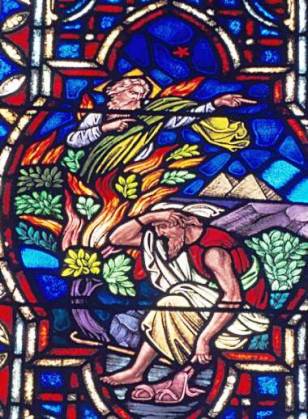
I've been rereading the story of Moses and the exodus of the Israelites as part of my daily scripture study, and I've been asking a Jewish friend for some insight on some of the passages that seem to me to be either cryptic or culturally significant.
Last night I asked him about Exodus 3:13.
And Moses said unto God, Behold, when I come unto the children of Israel, and shall say unto them, The God of your fathers hath sent me unto you; and they shall say to me, What is his name? what shall I say unto them?I wondered why Moses would ask this particular question. Would the Jews really have asked him what God's name was? And, if they would have, what answer would they have been expecting? Or what would they have done with that information?
I wondered if maybe Moses was anticipating that the Israelites would try to identify Moses's God as theirs--as opposed to all of the Egyptian or other gods that were running around being worshiped.
Or I wondered if Moses himself was wanting more information about the deity he was talking to, so he was using the Jews as a decoy, as an excuse to find out more about the God he was talking to.
Steve, my Jewish friend, raised this possibility: that Moses asked God what His name is, or what Moses should tell the Jews what God's name was, not to find out a name but to find out information about God himself. To explain, Steve pointed me to an online source:
In Jewish thought, a name is not merely an arbitrary designation, a random combination of sounds. The name conveys the nature and essence of the thing named. It represents the history and reputation of the being named.
This is not as strange or unfamiliar a concept as it may seem at first glance. In English, we often refer to a person's reputation as his "good name." When a company is sold, one thing that may be sold is the company's "good will," that is, the right to use the company's name. The Hebrew concept of a name is very similar to these ideas.
An example of this usage occurs in Ex. 3:13-22: Moses asks God what His "name" is. Moses is not asking "what should I call you;" rather, he is asking "who are you; what are you like; what have you done." That is clear from God's response. God replies that He is eternal, that He is the God of our ancestors, that He has seen our affliction and will redeem us from bondage.
And we see this, of course, in God's otherwise unusual/interesting response to Moses's question:
God is eternal
14 And God said unto Moses, aI AM THAT I AM: and he said, Thus shalt thou say unto the children of Israel, I AM hath sent me unto you.God is the god of our ancestors
15 And God said moreover unto Moses, Thus shalt thou say unto the children of Israel, The aLord God of your fathers, the God of Abraham, the God of Isaac, and the God of Jacob, hath sent me unto you: this is my bname for ever, and cthis is my dmemorial unto all generations.
17 And I have said, I will bring you up out of the aaffliction of bEgypt unto the land of the cCanaanites, and the Hittites, and the Amorites, and the Perizzites, and the Hivites, and the dJebusites, unto a eland flowing with milk and honey.18 And they shall ahearken to thy voice: and thou shalt come, thou and the elders of Israel, unto the king of Egypt, and ye shall say unto him, The Lord bGod of the Hebrews hath met with us: and now clet us go, we beseech thee, three days’ journey into the wilderness, that we may dsacrifice to the Lord our God.
I was struck, then, by the relationship between Steve's answer/this insight and this month's home and visiting teaching message by President Eyring.
So here it is--a parallelism of probable truth: That even as we are, as I am, as the Israelites were, so anxious to know that God remembers us, that He will rescue us from (our various kinds of) bondage, that He will be good to us after all this time, God is anxious--eager, anxious, wanting--for us to remember/know that He wants to be good to us in our suffering, that He always remembers us, and that He will protect us, if we will let Him.The Savior has always been the protector of those who would accept His protection. He has said more than once, “How oft would I have gathered you as a hen gathereth her chickens, and ye would not” (3 Nephi 10:5; see also, for example, Matthew 23:37; D&C 29:2).
The Lord expressed the same lament in our own dispensation after describing the many ways in which He calls us to safety: “How oft have I called upon you by the mouth of my servants, and by the ministering of angels, and by mine own voice, and by the voice of thunderings, and by the voice of lightnings, and by the voice of tempests, and by the voice of earthquakes, and great hailstorms, and by the voice of famines and pestilences of every kind, and by the great sound of a trump, and by the voice of judgment, and by the voice of mercy all the day long, and by the voice of glory and honor and the riches of eternal life, and would have saved you with an everlasting salvation, but ye would not!” (D&C 43:25).
There seems to be no end to the Savior’s desire to lead us to safety, and there is constancy in the way He shows us the path. He calls by more than one means so that it will reach those willing to accept it. Those means always include sending the message by the mouths of His prophets whenever people have qualified to have the prophets of God among them. Those authorized servants are always charged with warning the people, telling them the way to safety.
Ye would not. Ye would not.
That's a charge I'm praying I can change to avoid.

No comments:
Post a Comment